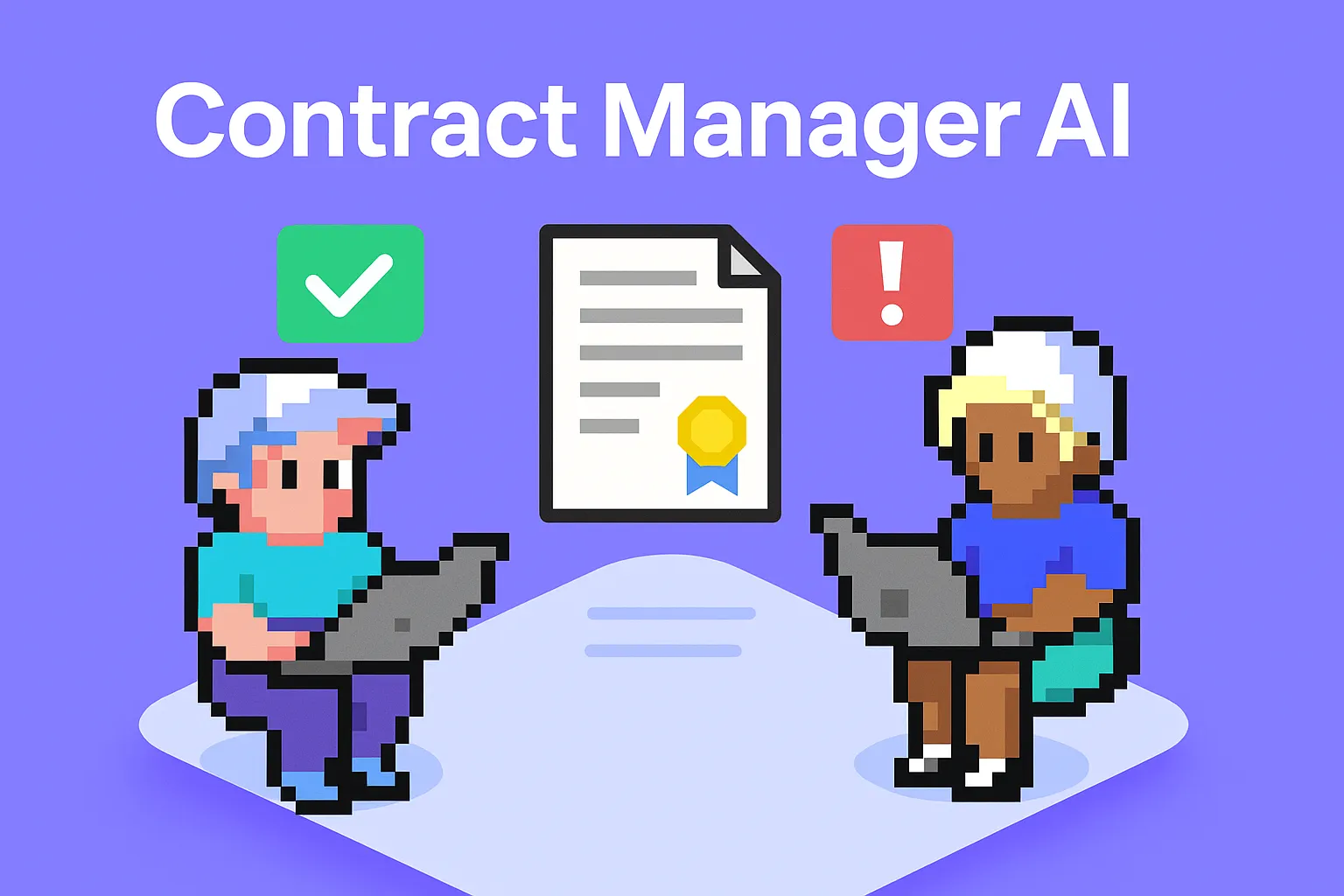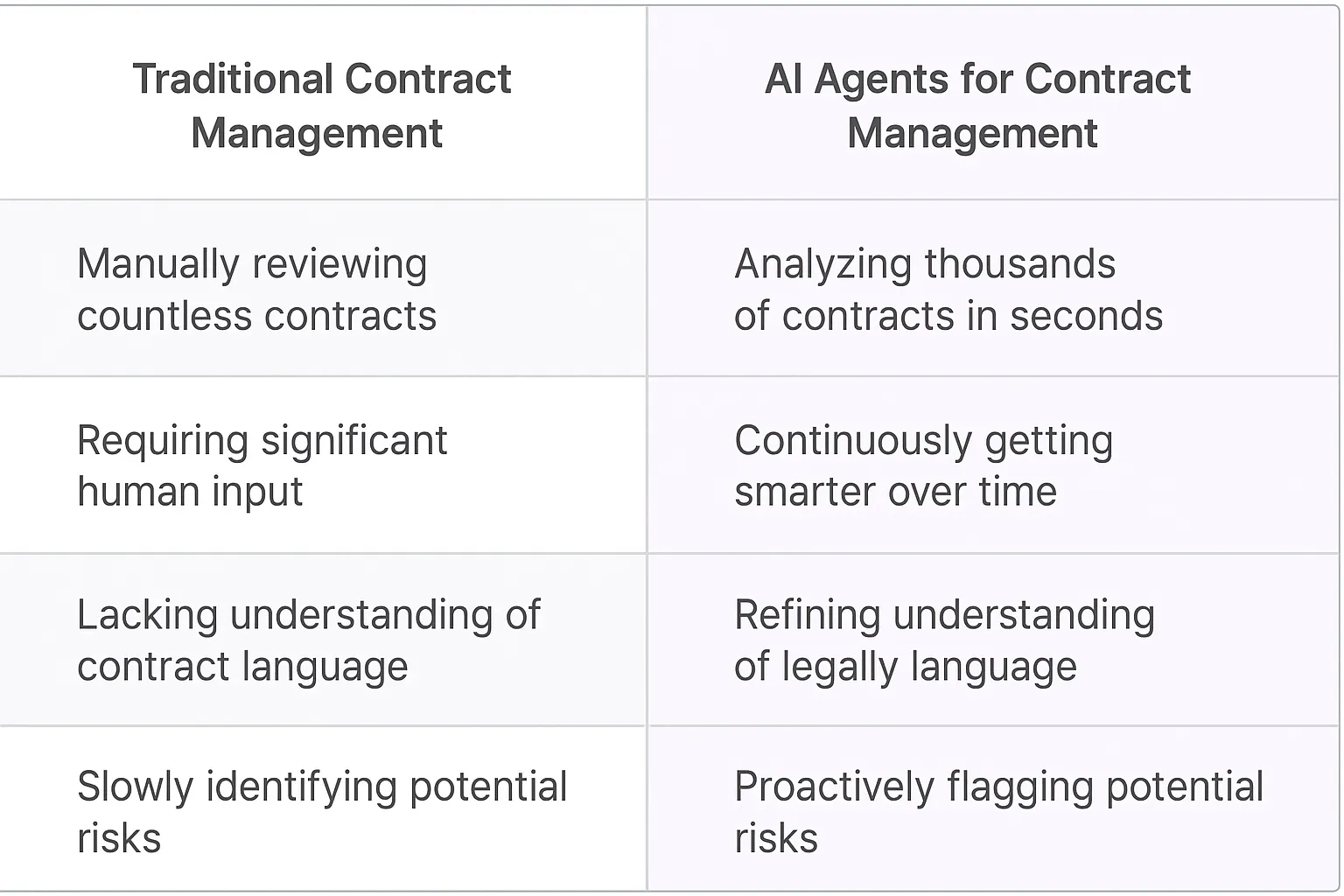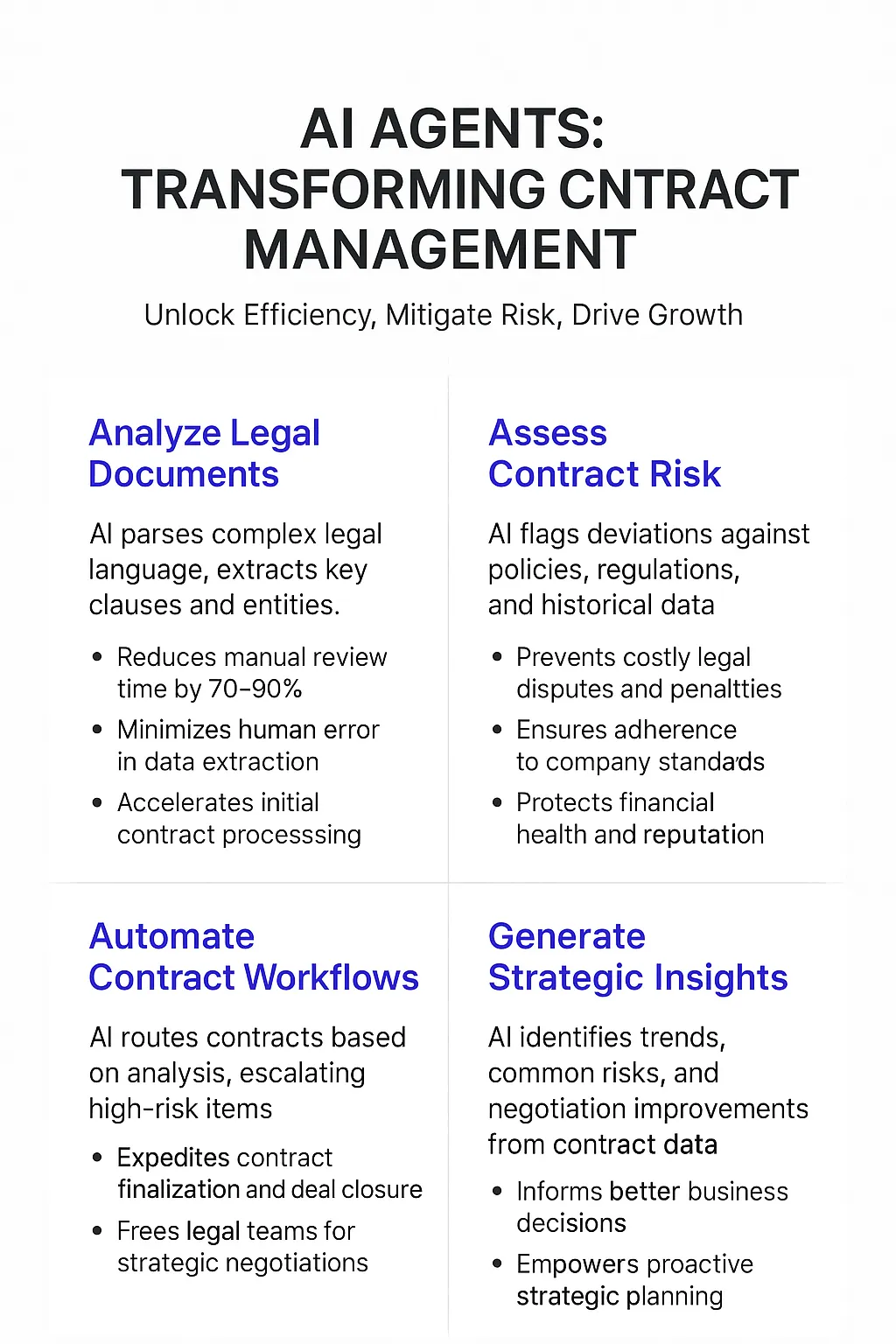Contract Manager is a sophisticated software solution designed to streamline and optimize the entire contract lifecycle. It's not just a digital filing cabinet; it's a dynamic system that leverages AI to automate contract creation, review, approval, and management processes. Think of it as your organization's legal brain, capable of processing vast amounts of contractual data and extracting actionable insights.
Contract Manager stands out with its AI-powered capabilities:1. Intelligent Document Analysis: It can parse and understand complex legal language, identifying key clauses and potential risks.2. Automated Workflow Management: The system orchestrates the contract lifecycle, routing documents for approval and flagging issues that need human attention.3. Risk Assessment and Compliance Tracking: It continuously monitors contracts for compliance issues and upcoming deadlines.4. Data-Driven Insights: By analyzing your contract portfolio, it can identify trends and opportunities for optimization.5. Integration Capabilities: It seamlessly connects with other business systems, creating a unified contract management ecosystem.These features combine to create a powerful tool that's transforming how businesses handle their contractual relationships.

Before AI agents entered the scene, contract management was a tedious, manual process. Legal teams and business professionals would spend countless hours poring over documents, cross-referencing clauses, and manually tracking deadlines. It was like trying to solve a Rubik's Cube blindfolded – possible, but incredibly time-consuming and error-prone.
Traditional contract management software offered some relief, but it was often clunky and required significant human input. These systems were essentially glorified databases, lacking the intelligence to truly understand and interpret contract language. Users still had to do the heavy lifting of analysis and decision-making, which meant that the potential for missed opportunities and overlooked risks remained high.
Enter AI agents for contract management – they're like having a team of tireless, brilliant legal minds working 24/7. These digital teammates bring a level of speed, accuracy, and insight that's transforming how businesses handle contracts. Here's why they're a game-changer:
1. Superhuman analysis capabilities: AI agents can process and analyze thousands of contracts in the time it takes a human to review a single document. They can identify patterns, inconsistencies, and potential risks that might slip past even the most eagle-eyed lawyer.
2. Continuous learning and improvement: Unlike static software, AI agents get smarter over time. They learn from each contract they process, constantly refining their understanding of legal language and industry-specific nuances. It's like having a legal prodigy that never stops studying.
3. Proactive risk management: These digital teammates don't just passively store information – they actively flag potential issues before they become problems. Imagine having a guardian angel that taps you on the shoulder whenever a contract clause could put your company at risk.
4. Unprecedented efficiency: AI agents automate the grunt work of contract management, freeing up human professionals to focus on high-level strategy and negotiation. It's like giving your legal team a time machine, allowing them to accomplish in hours what used to take weeks.
5. Enhanced decision-making: By providing deep insights and data-driven recommendations, AI agents empower businesses to make more informed decisions about their contractual relationships. It's like having a crystal ball that shows you the potential outcomes of different contract scenarios.
6. Seamless integration: These AI agents don't exist in a vacuum – they can integrate with existing systems and workflows, creating a smooth, end-to-end contract management process. It's like upgrading from a bicycle to a Tesla without having to learn a new way to commute.
The bottom line? AI agents for contract management aren't just an incremental improvement – they're a quantum leap forward. They're turning what was once a bottleneck in business operations into a source of strategic advantage. Companies that embrace these digital teammates will find themselves operating at a whole new level of speed, efficiency, and insight.

Contract management is ripe for AI-driven transformation. These digital teammates can tackle the heavy lifting of contract workflows, freeing up legal teams to focus on high-value strategic work. Here's how AI agents are reshaping contract management processes:
Breaking it down further, AI agents excel at handling specific contract-related tasks with precision and speed:
The integration of AI agents in contract management isn't just about efficiency gains. It's a fundamental shift in how legal teams operate, enabling them to scale their impact across the organization. By offloading routine tasks to AI, lawyers can focus on strategic decision-making and complex negotiations that truly move the needle.
This AI-driven approach to contract management also opens up new possibilities for data-driven insights. Imagine having a real-time pulse on your entire contract portfolio, with AI agents surfacing trends, risks, and opportunities that would be impossible to spot manually. It's not just about managing contracts; it's about unlocking the wealth of information hidden within them.
As these AI agents continue to learn and evolve, we're likely to see even more sophisticated use cases emerge. Think predictive analytics for contract outcomes, AI-assisted dispute resolution, or even autonomous contract negotiation for standardized agreements. The future of contract management is intelligent, proactive, and data-driven – and it's being shaped by the rapid advancement of AI agents in this space.

Contract Manager AI agents are reshaping how businesses handle legal agreements across sectors. These digital teammates bring a level of efficiency and accuracy that's transforming contract management from a bottleneck into a strategic advantage. Let's dive into some industry-specific scenarios where these AI-powered tools are making waves:
In legal firms, Contract Manager AI agents are becoming the unsung heroes of due diligence. They're combing through mountains of documents at lightning speed, flagging potential issues that human lawyers might miss after their third espresso. It's like having a tireless associate who never needs sleep and always remembers every clause they've ever read.
For tech startups, these AI agents are the secret weapon in navigating the complex world of intellectual property agreements. They're helping founders avoid those sneaky terms that could come back to bite them during their Series B. It's giving David a fighting chance against Goliath's army of corporate lawyers.
In the world of real estate, Contract Manager AI agents are the new power players in large-scale property transactions. They're analyzing lease agreements faster than you can say "location, location, location," ensuring no detail slips through the cracks. It's like having a photographic memory for every square foot of fine print.
These are just a few examples of how Contract Manager AI agents are becoming indispensable across industries. They're not just tools; they're digital teammates that are redefining what's possible in contract management. The companies that embrace this tech aren't just keeping up – they're setting the pace for everyone else.
The real estate industry is ripe for disruption, and Contract Manager AI Agents are poised to be the game-changers. These digital teammates can revolutionize how property transactions are handled, making the process smoother, faster, and more accurate than ever before.
Think about it: real estate deals involve a mountain of paperwork, complex legal jargon, and countless back-and-forths between parties. It's a nightmare for agents, buyers, and sellers alike. Enter the Contract Manager AI Agent – your new secret weapon in closing deals.
These AI-powered tools can scan through lengthy contracts in seconds, flagging potential issues and inconsistencies that human eyes might miss. They can compare clauses against a database of standard terms, ensuring that nothing unusual slips through the cracks. But that's just the beginning.
The real magic happens when these agents start learning from each transaction. They'll pick up on patterns in negotiation tactics, identify common sticking points, and even suggest optimal terms based on historical data. It's like having a seasoned real estate veteran whispering advice in your ear, except this one never sleeps and has perfect recall.
For real estate professionals, this means spending less time buried in paperwork and more time building relationships and closing deals. For clients, it translates to faster transactions, reduced risk, and increased confidence in the process.
But here's where it gets really interesting: as these AI agents become more sophisticated, they could start predicting market trends, suggesting optimal timing for listings, and even identifying potential buyers based on contract preferences. We're talking about a level of market intelligence that was previously unimaginable.
The real estate industry is notoriously resistant to change, but the advantages offered by Contract Manager AI Agents are too significant to ignore. Early adopters will gain a massive competitive edge, leaving traditional agencies scrambling to catch up. It's not just about efficiency – it's about redefining what's possible in real estate transactions.
As with any transformative technology, there will be challenges. Privacy concerns, data security, and the need for human oversight are all critical issues that need to be addressed. But make no mistake – Contract Manager AI Agents are set to reshape the real estate landscape. The question isn't if it will happen, but who will be bold enough to lead the charge.
The manufacturing industry is on the cusp of a major shift, and Contract Manager AI Agents are the catalysts. These digital teammates are set to transform how industrial companies handle their complex web of supplier agreements, distribution contracts, and regulatory compliance documents.
Manufacturing contracts are notoriously intricate. They involve detailed specifications, strict quality standards, complex pricing structures, and elaborate delivery schedules. It's a minefield of potential errors and oversights that can cost companies millions. This is where Contract Manager AI Agents shine.
These AI-powered tools can dissect a 100-page supplier agreement in minutes, identifying potential risks, inconsistencies, and opportunities for optimization. They can cross-reference clauses with industry standards, flag deviations from company policies, and even suggest improvements based on historical performance data.
But the real power lies in their ability to learn and adapt. As these AI agents process more contracts, they start to recognize patterns specific to your industry and your company. They'll learn which suppliers consistently meet their obligations, which contract terms lead to the best outcomes, and even predict potential supply chain disruptions based on contractual red flags.
For manufacturing executives, this means shifting from reactive contract management to proactive strategic planning. Imagine being able to optimize your entire supplier network based on contract performance data, or renegotiating distribution agreements with pinpoint precision on terms that matter most.
The implications for regulatory compliance are equally profound. In an industry where a single overlooked clause can lead to hefty fines or product recalls, having an AI agent that never misses a beat is invaluable. These digital teammates can ensure every contract aligns with the latest regulations across multiple jurisdictions, dramatically reducing compliance risks.
But here's where it gets really interesting: as these AI agents become more sophisticated, they could start influencing product development and innovation. By analyzing trends in supplier contracts, they might identify emerging technologies or materials that could give your company a competitive edge.
The manufacturing sector is often seen as slow to adopt new technologies, but the potential impact of Contract Manager AI Agents is too significant to ignore. Early adopters will gain a massive advantage in operational efficiency, risk management, and strategic planning.
Of course, implementing these AI agents isn't without challenges. Data security, integration with existing systems, and the need for human oversight are all critical considerations. But for manufacturing companies willing to embrace this technology, the rewards far outweigh the risks.
Contract Manager AI Agents aren't just tools; they're strategic assets that will redefine how manufacturing companies operate. The question isn't whether this transformation will happen, but who will be bold enough to lead it. Are you ready to be at the forefront of this revolution in contract management?
Implementing a Contract Manager AI Agent isn't just about slapping some machine learning on a document parser. It's a complex dance of algorithms, data structures, and natural language processing that would make even the most seasoned engineers sweat.
First off, we're dealing with unstructured data in various formats. Contracts come in PDFs, Word docs, scanned images – you name it. Our AI needs to be a polyglot, fluent in parsing all these formats without breaking a sweat. It's like teaching a robot to read everything from Shakespeare to doctor's handwriting.
Then there's the NLP challenge. Contracts are filled with legalese, industry jargon, and context-dependent clauses. Our AI needs to not just read, but comprehend. It's the difference between a tourist with a phrase book and a native speaker – our AI needs to be the latter.
Let's not forget about data security. We're handling sensitive information here. Our AI needs to be Fort Knox level secure, but with the agility of a cat burglar to access and process data quickly. It's a tightrope walk between security and efficiency.
On the operational side, we're not just building a tool; we're reshaping entire workflows. It's like trying to change the tires on a moving car – tricky, but not impossible if you know what you're doing.
User adoption is a big hurdle. Legal teams are often set in their ways, and for good reason – precision is key in their world. Convincing them to trust an AI with contract management is like asking a chef to let a robot taste their soup. It requires a delicate balance of demonstrating value while respecting their expertise.
Integration with existing systems is another beast. Most companies have a Frankenstein's monster of legacy systems held together with digital duct tape. Our AI needs to play nice with all of these, from ancient document management systems to cutting-edge CRMs. It's like being the new kid in school who needs to befriend everyone from the chess club to the jocks.
Lastly, there's the ever-evolving nature of contract law and business practices. Our AI can't just be smart; it needs to be adaptable. We're not building a static tool, but a learning system that can keep pace with the dynamic world of business and law. It's like training for a marathon that keeps changing its route – you need to be prepared for anything.
Contract Manager AI agents are more than just a technological upgrade; they're a paradigm shift in contract management. By offloading routine tasks to these digital teammates, legal teams can focus on high-value strategic work. The insights provided by these AI agents enable data-driven decision-making, potentially uncovering opportunities and mitigating risks that would be impossible to spot manually.However, the journey isn't without challenges. Technical hurdles like parsing unstructured data and ensuring ironclad security must be overcome. Operationally, companies need to navigate user adoption and integration with existing systems.Despite these challenges, the potential benefits are too significant to ignore. Early adopters of Contract Manager AI agents will likely gain a substantial competitive advantage. As these systems continue to evolve and learn, we can expect even more sophisticated capabilities to emerge, further revolutionizing how businesses manage their contractual relationships.The future of contract management is intelligent, proactive, and data-driven. Companies that embrace this AI-powered future will be well-positioned to thrive in an increasingly complex business landscape. The question isn't whether to adopt these technologies, but how quickly you can integrate them into your operations.